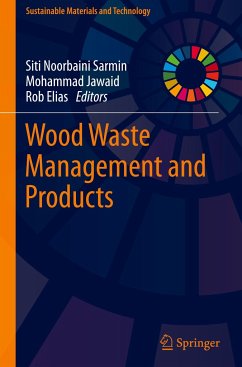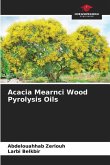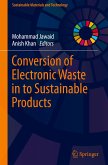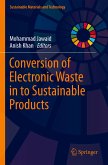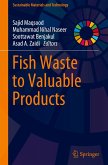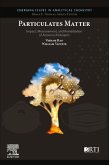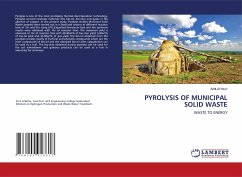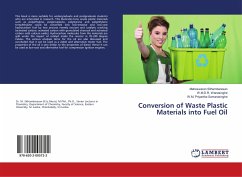Wood Waste Management and Products
Herausgegeben:Sarmin, Siti Noorbaini; Jawaid, Mohammad; Elias, Rob
Wood Waste Management and Products
Herausgegeben:Sarmin, Siti Noorbaini; Jawaid, Mohammad; Elias, Rob
- Gebundenes Buch
- Merkliste
- Auf die Merkliste
- Bewerten Bewerten
- Teilen
- Produkt teilen
- Produkterinnerung
- Produkterinnerung
This book examines the application of wood waste in various advancements in environmental fields, such as construction, renewable energy, bio-absorbent, and agricultural and wood-based material. Featuring illustrations, and tables summarizing the latest research, it gathers up-to-date information on the application of various types of wood waste which could be applied in a practical manner to materially reduce nuisance created by fallout of wood-based industries from different sources. Given its scope, the book is a valuable reference book for research students and reference resources for…mehr
Andere Kunden interessierten sich auch für
![Acacia Mearnci Wood Pyrolysis Oils Acacia Mearnci Wood Pyrolysis Oils]() Abdelouahhab ZeriouhAcacia Mearnci Wood Pyrolysis Oils26,99 €
Abdelouahhab ZeriouhAcacia Mearnci Wood Pyrolysis Oils26,99 €![Conversion of Electronic Waste in to Sustainable Products Conversion of Electronic Waste in to Sustainable Products]() Conversion of Electronic Waste in to Sustainable Products125,99 €
Conversion of Electronic Waste in to Sustainable Products125,99 €![Conversion of Electronic Waste in to Sustainable Products Conversion of Electronic Waste in to Sustainable Products]() Conversion of Electronic Waste in to Sustainable Products125,99 €
Conversion of Electronic Waste in to Sustainable Products125,99 €![Fish Waste to Valuable Products Fish Waste to Valuable Products]() Fish Waste to Valuable Products117,99 €
Fish Waste to Valuable Products117,99 €![Particulates Matter Particulates Matter]() Vikram RaoParticulates Matter87,99 €
Vikram RaoParticulates Matter87,99 €![PYROLYSIS OF MUNICIPAL SOLID WASTE PYROLYSIS OF MUNICIPAL SOLID WASTE]() Srilatha KPYROLYSIS OF MUNICIPAL SOLID WASTE26,99 €
Srilatha KPYROLYSIS OF MUNICIPAL SOLID WASTE26,99 €![Conversion of Waste Plastic Materials into Fuel Oil Conversion of Waste Plastic Materials into Fuel Oil]() Maheswaran SithambaresanConversion of Waste Plastic Materials into Fuel Oil19,99 €
Maheswaran SithambaresanConversion of Waste Plastic Materials into Fuel Oil19,99 €-
-
-
This book examines the application of wood waste in various advancements in environmental fields, such as construction, renewable energy, bio-absorbent, and agricultural and wood-based material. Featuring illustrations, and tables summarizing the latest research, it gathers up-to-date information on the application of various types of wood waste which could be applied in a practical manner to materially reduce nuisance created by fallout of wood-based industries from different sources. Given its scope, the book is a valuable reference book for research students and reference resources for researchers, academics, and industrial scientists working in the field of wood waste management and their utilization.
Produktdetails
- Produktdetails
- Sustainable Materials and Technology
- Verlag: Springer / Springer Nature Singapore / Springer, Berlin
- Artikelnr. des Verlages: 978-981-99-1904-8
- 2023
- Seitenzahl: 244
- Erscheinungstermin: 13. Mai 2023
- Englisch
- Abmessung: 241mm x 160mm x 18mm
- Gewicht: 580g
- ISBN-13: 9789819919048
- ISBN-10: 9819919045
- Artikelnr.: 67594754
- Sustainable Materials and Technology
- Verlag: Springer / Springer Nature Singapore / Springer, Berlin
- Artikelnr. des Verlages: 978-981-99-1904-8
- 2023
- Seitenzahl: 244
- Erscheinungstermin: 13. Mai 2023
- Englisch
- Abmessung: 241mm x 160mm x 18mm
- Gewicht: 580g
- ISBN-13: 9789819919048
- ISBN-10: 9819919045
- Artikelnr.: 67594754
Siti Noorbaini Sarmin is Senior Lecturer at Malaysia's Universiti Teknologi MARA Pahang. She was awarded a postdoctoral scholarship from the Malaysian Ministry of Higher Education from 2021 to 2022 at INTROP, Universiti Putra Malaysia. She received her B.Tech. in Bioresources, Paper, and Coating from Universiti Sains Malaysia in 2007, her M.Sc. from the same university in 2009, and her Doctor of Natural Sciences from the University of Hamburg in Germany in 2017. Natural fiber composites, conventional wood composites, timber trade management, and wood sciences are among her research interests. She has produced or co-authored over 50 publications in international journals, book chapters, and conference proceedings/seminars to date. She currently holds many national research grants for related studies. Dr. Mohammad Jawaid is currently working as Senior Fellow (Professor) at Biocomposite Technology Laboratory, Institute of Tropical Forestry and Forest Products (INTROP), Universiti Putra Malaysia (UPM), Serdang, Selangor, Malaysia, and also has been Visiting Professor at the Department of Chemical Engineering, College of Engineering, King Saud University, Riyadh, Saudi Arabia, since June 2013. He has more than 20 years of experience in teaching, research, and industries. His area of research interests includes hybrid composites, lignocellulosic-reinforced/filled polymer composites, advanced materials: graphene/nanoclay/fire retardant, modification and treatment of lignocellulosic fibers and solid wood, biopolymers and biopolymers for packaging applications, nano-composites and nanocellulose fibers, and polymer blends. So far, he has published 40books, 65 book chapters, more than 350 peer-reviewed international journal papers, and several published review papers under top 25 hot articles in science direct during 2013-2019. He also obtained 2 patents and 6 copyrights. H-index and citation in Scopus are 52 and 12521, and in Google Scholar, H-index and citation are 61 and 17402. He is founding Series Editor of Composite Science and Technology Book Series from Springer Nature, also Series Editor of Springer Proceedings in Materials, Springer Nature, and also International Advisory Board Member of Springer Series on Polymer and Composite Materials. He worked as Guest Editor of special issues of SN-applied Science, Frontiers in Sustainable Food Systems, Current Organic Synthesis, and Current Analytical Chemistry, International Journal of Polymer Science, and IOP Conference Proceeding. He is also Editorial Board Member of Journal of Polymers and The Environment, Journal of Plastics Technology, Applied Science and Engineering ProgressJournal, Journal of Asian Science, Technology and Innovation, and the Recent Innovations in Chemical Engineering. Besides that, he is also Reviewer of several high-impact international peer-reviewed journals of Elsevier, Springer, Wiley, Saga, ACS, RSC, Frontiers, etc. Presently, he is supervising 12 Ph.D. students (5 Ph.D. as Chairman and 7 Ph.D. as Member) and 6 master's students (1 master as Chairman and 5 master as Member) in the fields of hybrid composites, green composites, nano-composites, natural fiber-reinforced composites, nanocellulose, etc. Twenty-six Ph.D. and 13 master's students graduated under his supervision in 2014-2020. He has several research grants at university, national, and international levels on polymer composites of around 3 million Malaysian ringgits (USD 700,000). He also delivered plenary and invited talks in international conferences related to composites in India, Turkey, Malaysia, Thailand, the UK, France, Saudi Arabia, Egypt, and China. Besides that,he is also Member of technical committees of several national and international conferences on composites and material science. Recently, Dr. Mohammad Jawaid received Excellent Academic Award in the Category of International Grant-Universiti Putra Malaysia-2018 and also Excellent Academic Staff Award in Industry High-Impact Network (ICAN 2019) Award. Besides that, he received Gold Medal-Community and Industry Network (JINM Showcase) at Universiti Putra Malaysia. He also received Publons Peer Review Awards, 2017 and 2018 (Materials Science), and Certified Sentinel of Science Award Recipient, 2016 (Materials Science) and 2019 (Materials Science and Crossfield). He is also Winner of Newton-Ungku Omar Coordination Fund: UK-Malaysia Research and Innovation Bridges Competition 2015. Recently, he got Fellow and Chartered Scientist from the Institute of Materials, Minerals and Mining (IOM), UK. He is also Life Member of Asian Polymer Association and Malaysian Society for Engineering and Technology. He has professional membership of American Chemical Society (ACS) and Society for Polymers Engineers (SPE), USA. Dr. Rob Elias is Director of the BioComposites Centre at Bangor University with a staff of 25 scientists. The center was established in 1989 to work with companies to develop new technologies based on sustainable materials such as wood. The center has state-of-the-art facilities including pilot-scale equipment that enables companies to demonstrate their ideas by developing prototype materials. Rob has a major interest in the development of bio-derived materials that reduce global warming potential. He has an industrial and academic background in natural fiber production. His expertise includes wood-based panel production, biomass extraction/chemical composition, and product development. His current research interests include biorefining, the production of bioplastic products, extraction of value-added molecules from plant materials, utilization of wastes, and agricultural co-products for construction applications.
Wood waste categorization and reuse possibilities.- Challenges and opportunities in wood waste utilization.- Life cycle assessment of output from wood waste.- Concern on wood waste utilization: environment and economic evaluation.- The development and performances of wood waste briquettes in pyrolysis reactor system.- Biochar from wood wastes: properties and recent advances applications.- Wood waste as a renewable energy sources: sustainable ethanol production.- From wood waste to bio sorbent: adsorption characteristics and mechanisms.- Experimental and analysis of composite material based on wood waste.- Present scenario and future scope the used of wood waste in wood plastic composite.- Viability of building materials made of wood waste - sustainability and its performances.- Building material in circular economy: the suitability of wood waste in bio concrete development.- Employment of wood waste in agriculture: recent trends and advancement.- Potential used of residual sawdust - aversatile, inexpensive and readily available bio-waste.- Potential used of residual wood bark - chemical compositions and its potential used.- Potential used of residual wood shavings - an economic sustainable production.- Potential used of residual peeler core - scrutiny of small-log processing.
Wood waste categorization and reuse possibilities.- Challenges and opportunities in wood waste utilization.- Life cycle assessment of output from wood waste.- Concern on wood waste utilization: environment and economic evaluation.- The development and performances of wood waste briquettes in pyrolysis reactor system.- Biochar from wood wastes: properties and recent advances applications.- Wood waste as a renewable energy sources: sustainable ethanol production.- From wood waste to bio sorbent: adsorption characteristics and mechanisms.- Experimental and analysis of composite material based on wood waste.- Present scenario and future scope the used of wood waste in wood plastic composite.- Viability of building materials made of wood waste - sustainability and its performances.- Building material in circular economy: the suitability of wood waste in bio concrete development.- Employment of wood waste in agriculture: recent trends and advancement.- Potential used of residual sawdust - aversatile, inexpensive and readily available bio-waste.- Potential used of residual wood bark - chemical compositions and its potential used.- Potential used of residual wood shavings - an economic sustainable production.- Potential used of residual peeler core - scrutiny of small-log processing.

